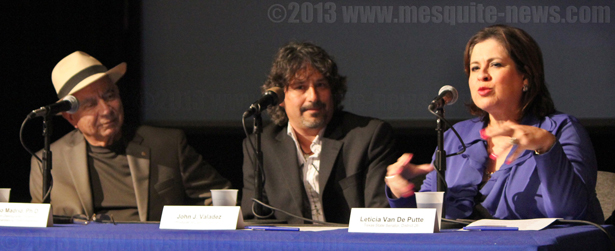
By Nicole West
Educators interested in resources on Mexican-American history have a new classroom resource.
“Latino Americans,” a documentary series produced by five producers, including John Valadez, may contribute to teaching Mexican-American history in U.S. schools.
Two back-to-back episodes will air tonight at 7 p.m., Sept. 24 and Oct. 1 nationally on PBS. The series will also be broadcast in Spanish on Vme, the Spanish-language channel on public television.
The three-part, six-hour series portrays how Latinos, the largest minority group in the U.S., played a vital role forming the country from the times of early settlement in the 1500s to present day. The series was screened and discussed Friday evening at KLRN Studios in San Antonio.
The series includes a bilingual digital engagement campaign and “provides an interactive way to approach and understand Latino American history, its contribution, and its role in American history, according to a press release.
Documentary learning resources:
-
To share videos: www.pbs.org/latino-americans/en/send-videos/
-
To contribute to blog: http://www.pbs.org/latino-americans/en/blog/
-
Be a part of the conversation on Twitter: #LatinosPBS
During a recent panel at KLRN, Valadez said PBS is currently creating a free study guide for anyone to download. [Editor’s note: The study guide is not currently available. Information will be updated as soon as information becomes available.]
Last week’s panel discussion and screening was moderated by Elaine Ayala, San Antonio Express-News reporter and Conexión columnist. The panelists included Valadez, Arturo Madrid, Trinity University professor, and Sen. Leticia Van de Putte, D-San Antonio.
The evening began with a welcome by Mario Vasquez, president and CEO of KLRN, as patrons enjoyed chalupas and quesadillas.
As members of the audience took their seats, excerpts from the six episodes were shown just before the panel discussion.
Though many topics were touched on by the panelists, one topic was shared between the three; the lack of Mexican-American history taught in the education system.
“As a little girl, I dreaded the month of March and April in our public schools because they told a story about The Alamo,” Sen. Van de Putte, D-San Antonio. said. “And anybody with that Hispanic last name was made to feel like we were the murderers of the real heroes of The Alamo.”
Latino American history wasn’t a priority until the Chicano movement, when scholars started publishing Latino history books, Valadez said.
Ayala asked Valadez how hard it was to obtain the footage and photos to complete the documentary.
Valadez said it was really difficult because It was expensive in the 1900s to have a film camera. “Most Mexican-Americans did not have access to that technology,” he said.
“So you try to go back and find visual imagery in this country and it’s extraordinarily difficult,” he said. “It almost doesn’t exist.”
“We found some though, and it’s like gold,” Valadez said.
KLRN will broadcast the episodes as follows:
-
Sept. 17, episode one, “Foreigners in Their Own Land” will air followed by episode two, “Empire of Dreams.”
-
Sept. 24, episode three, “War and Peace” will air followed by episode four, “The New Latinos.”
-
Oct. 01, episode five, “Prejudice and Pride” will air followed by episode six, “Peril and Promise.”
“I guess my hope is that by making these films…our progeny will have these stories and they will know what we did to shape this country… and we will be a living people,” Valadez said.
Throughout the summer, panel discussions also took place in Phoenix; Austin; Miami; Los Angeles; New York; and Washington, D.C.
Towards the end of the evening, Van de Putte turned to Valadez and said, “having been a pharmacist now for over 30 years, I see things kind of in a healthcare framework, and I want to thank you for this body of work because what you have done is began the cure of the purposeful, historical amnesia of this country with respect to Latinos.”
This is just the beginning, Valadez said. The Latino community is asked to share their experience to the PBS “Latino American” blog.
To learn about the documentary, contribute to the blog and to share your video, visit http://www.pbs.org/latino-americans/en/





